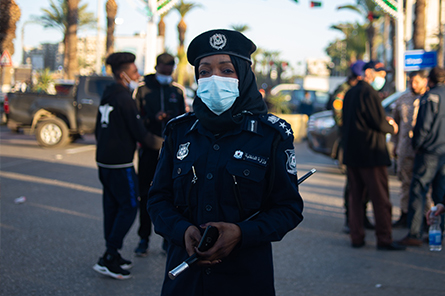Trust Fund for North Africa
The Trust Fund for Security Sector Development Assistance in North Africa (TFNA) was established in 2012, in response to the 2011 uprisings in North Africa.
Its aim is to improve the security of people by facilitating SSG/R assistance to Libya, Morocco, and Tunisia and promoting good SSG/R across North Africa. In such dynamic and challenging contexts, the Fund is an effective and efficient tool for adaptive, flexible, and needs-driven programme design and implementation.
In all our TFNA programmes, we rely on the guidance of our TFNA Steering Committee members, currently the Netherlands, Germany, Switzerland, Luxembourg and France, as well as on the collaboration with our national partners and trusted relationships with relevant stakeholders in the region.

About the Trust Fund
In the first weeks following the Tunisian Revolution, the Geneva Center for Security Sector Governance (DCAF) offered its expertise to the transitional government. Since February 2011, DCAF has been reinforcing its cooperation with the Tunisian government through concluding agreements and developing assistance programmes with several ministries (Interior, Justice and Defence). In July 2011, Tunisia joined the DCAF Foundation Council and became its 60th member state. In order to facilitate the implementation of its cooperation programme, DCAF opened an office in Tunis in October 2011. This office has been part of the Trust Fund programme since June 2012. The objective of the TFNA’s programme in Tunisia is to assist the authorities in establishing good governance of armed forces, police and security forces which are to:
- Operate under clear policy and legal frameworks;
- Deliver efficient services in a transparent manner, in line with the security needs of citizens;
- Adhere to the principle of rule of law, and whose individual members are fully accountable for their actions;
- Are properly managed and overseen by the executive, legislative and judicial authorities;
- Are subject to informal oversight by the media and civil society.
Learn more about DCAF Tunisia Programme
Project Websites
The Trust Fund for North Africa has been active in Libya since 2012. In the wake of Libya’s revolution, the Libyan authorities sought DCAF’s support for reforming the country’s justice and security sector institutions. As a neutral and independent actor, the TFNA aims to support Libyan stakeholders in enhancing good security sector governance. The TFNA and its programmes contribute to the development of effective, efficient and transparent security and justice providers.
By making a contribution to improving good governance in the area of security, the TFNA supports Libya’s democratic transition and helps to advance peace and stability in the region. Currently, DCAF articulates its support to Libyan institutions and stakeholders through a five-legged approach: contributing to SSR and DDR doctrine-development and policy design, supporting multilateral actors and UN-led processes in Libya, supporting Libyan Ministries in their capacity development, facilitating access to reliable information and supporting the development of independent oversight at local level.
Learn more about DCAF Libya Programme
Project Websites
In 2011, Morocco adopted a new Constitution enshrining the Kingdom’s commitment in favour of the rule of law and human rights, and proposing a new governance model, grounded on independent oversight institutions, promotion of human rights, good governance and human development.
Justice Reform and security sector governance have been a priority for consolidating democracy. Reforms have been undertaken to strengthen the accountability, transparency, and efficiency of the security sector. Citizen’s trust in legitimate and effective institutions, in respect of the rule of law, promoting the prevention of ill-treatment, integrity and accountability represent other national policy priorities.
DCAF’s program in Morocco is engaged with government institutions, oversight authorities and human rights protection bodies to support the Moroccan authorities in the implementation of security and justice sector reform.
Learn more about DCAF Morocco Programme
Project Websites
- coming soon
The January 2011 revolution in Egypt opened a dialogue on the country’s democratisation. After the 2011 revolution and President Morsi’s ouster in July 2013, the Egyptian army continues to play an important role in the political, social and economic spheres. Since the 2011 revolution, a debate has emerged within Egyptian society on civil-military relations and their influence on Egypt’s democratic transition. Against this background, the TFNA aims to contribute to an open, informed and constructive debate on civil-military relations in Egypt among key stakeholders and the general public.
The following donors contribute to some or all TFNA programmes:
- Switzerland: The Swiss Confederation has supported the TFNA since 2012.
- The Netherlands: The Ministry of Foreign Affairs of the Kingdom of the Netherlands has supported the TFNA since 2013.
- Germany: The Ministry of Foreign Affairs of the Federal Republic of Germany has supported the TFNA since 2015.
- France: The Ministry of Foreign Affairs of the Government of France has supported TFNA since 2018.
- Luxembourg: The Ministry of Foreign Affairs of the Government of Luxembourg has supported TFNA projects since 2012.
PUBLICATIONS
Contacts
Emma Behrens, Project Officer – Middle East & North Africa Division, (e.behrens@dcaf.ch)
